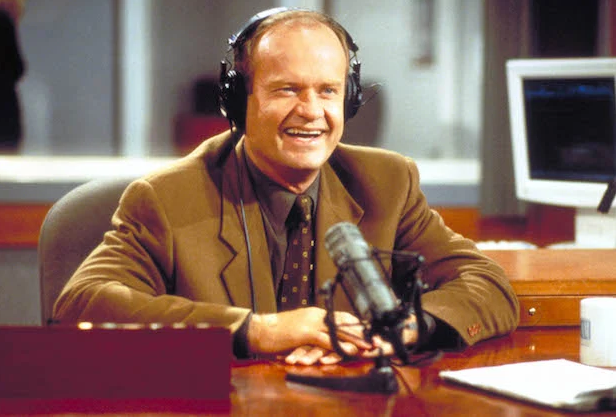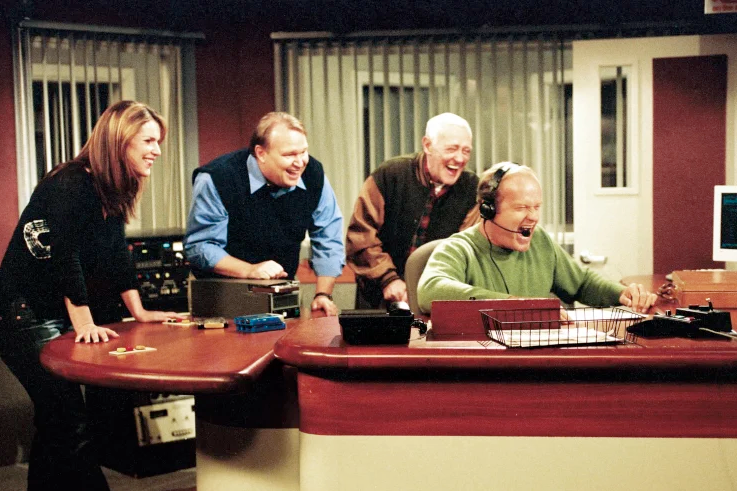Bring on the Frasier reboot, even though it gets my profession so wrong

One of my favourite TV shows is about to be revived. It’s the sitcom Frasier, set in the world of American commercial radio. As someone who works in radio, I like it – despite its setting. No one wants to see their own profession depicted on TV. They always get it wrong.
On Frasier, for example, he always sits a mile away from the microphone. This wouldn’t work. It would sound echoey and weird. You need to be no further away than a fist’s width; everyone knows that.
Oh, and he and the producer turn up about one minute before the broadcast begins, rather than the four or five hours required in the world of real radio. My boss wouldn’t allow it – why does his?

TV and film producers make these sorts of mistakes with every profession.
In medical shows, the nurses spend most of their time flirting with the doctors. I have asked nurses about this. They tell me the main high-stakes drama during the typical shift is whether they can find five minutes to have a wee. Flirting? Not so much a priority. I await to see the triumphant scene, in which Nurse Tracy finally manages to have a wee, after hours of trying, the swelling music celebrating the moment of release.
In any show dealing with education, all teachers are depicted as time-serving dolts – “Anyone? Anyone? Bueller? Bueller?” – except for the inspiring one, sometimes played by Robin Williams, who arrives out of the blue and changes everyone’s life forever. The other teachers can only stand back in disbelief and cheer on the first person to ever think, “I know, why don’t I try to inspire the kids.” What a genius!
Police are OK, except they all have this cranky boss who won’t let them do their job. Mate, just let them get on with it! My God, they’d be good if it were not for this rule-ticking, time-serving, grumpy-guts. And he’s in every series of every show. Who knows where they find these idiots when it comes time for a promotion, because the junior police are all great.
I do need to have a word about authors. As soon as you publish a book, it is given a whole shopfront in a New York bookshop. There is no exception to this rule. There’s not even room in the window for a single book by another author. This compares to the reality in which your newly published book is represented by one copy, up the back of the store, and placed in the wrong section.
Media moguls, of course, are always depicted as evil megalomaniacs, with children locked in a battle over the succession, but that might be one stereotype that’s true. Ditto, the advertising executives who spent most of the 1960s dead drunk.
I’m less convinced about the architects. For a start, they are so numerous. Try to imagine a job for a middle-class family man in a TV show, and it’s always “oh, he’s an architect”. They also always work from home, which I don’t think is right.
And why can young New Yorkers always afford a centrally located apartment? According to the world of Friends, just how much does a palaeontologist get paid?

All reporters are investigative journalists, dealing with a boss so cranky he could be chief superintendent from a police show. The journalists, by the way, only ever meet their contacts in a striptease bar, or perhaps in a hotel parking lot.
Every psychiatrist is a devotee of Freudian psychoanalysis, while, in reality, hardly any are. The bartender always has time to talk, rather than being run off their feet. The construction workers are always whistling at passing women, even though they are usually working behind three layers of hoardings.
Of course, we forgive it all: it’s all in the name of providing entertainment. A show that really captured policing would feature someone methodically examining CCTV footage for ten days in a row.
Farmers would sit on a combine harvester for weeks at a time, teachers would fill in paperwork late at night, and coroners would wait for a month for a blood sample to be returned.
Radio, depicted accurately, would be even duller. It would mainly feature people sitting around typing for hours on end, in between trying to make contact with a professor who’d just published some exciting new research before deciding to head off on holidays an hour later.
Then there’s the nail-biting drama, just before airtime, of trying to nurse the printer back into life.
Despite it all, Frasier does get a few things right about the world of radio. It’s enormous fun. The listeners are the best part. And the producer is always smarter than the presenter.
It’s now nearly 20 years since they last made an episode, and this series – expected later this year – will be, alas, without the late John Mahoney. And true fans will also miss the wonderful David Hyde Pierce, the best thing in the show.
But for all that, I can’t wait. Especially if, this time around, they could sit a little closer to the mic.